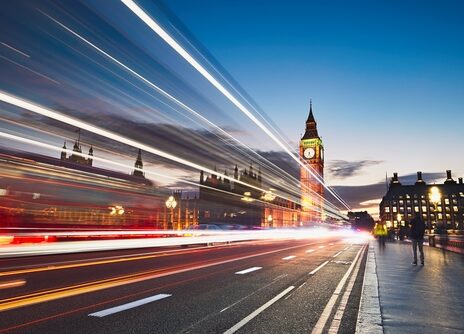
In the spring of 2016, as Britain hung like a drop of sweat off the nose of the European project, French riot police squelched into the Calais Jungle and began tearing it down. I was there reporting on the refugee camp. We parked outside a makeshift terrace of corrugated iron and tarpaulin huts, and when we returned a few hours later it was all gone. Left behind was a wasteland, studded with the detritus of living: a toothbrush, odd shoes, magazines, mattresses, a chubby-cheeked doll.
It took months to destroy the slum city. What struck me most from that time was a young man – no older than his early twenties – I saw sitting on an upturned tyre where his temporary home had stood, with his head in his hands. He looked just like my dad did in his youth. Moustache, curly black hair, fuzz of stubble, turned-up trousers and a too-tight T-shirt. Numerous refugees in Calais at that time were fleeing Syria, Iraq, Iran – the same part of the world my dad had escaped when he was 21.
In August 1976, he fled the Lebanese Civil War by smuggling himself on to a boat from Beirut to Cyprus. And like many of those scrambling on to dinghies to make the Channel crossing to English shores today, he didn’t stop in the first European country he reached. He carried on: another boat to Athens, and then a flight to London.
I often wonder how the arrival of my dad would be received in today’s Britain, with its psychological scorecard of attributes for the acceptable migrant. Facing “genuine” danger? Pass. Didn’t stay in the first safe country on his journey? Fail. Had links to the UK? Pass – one of his brothers had already moved here, and he spoke English. High-skilled? Pass – the war cut short his mechanical engineering studies in Beirut; he came to the UK on a student visa to finish his degree. Black-economy activity? Fail. While studying, he worked illegally as an usher in West End theatres (more of a technicolour than black market, granted). A single young man? Fail, fail, fail.
Ironically for a country that for decades forgot to measure how many people were arriving at airports besides Heathrow, Gatwick and Manchester, Britain is obsessed with immigration and asylum numbers. Struggling to bring down those numbers, politicians now fixate on defining the deserving and undeserving newcomer: those with “legitimate” asylum claims vs those who are “economic migrants”; those with “family ties” vs those without; those who follow an official process vs those who try “irregular” routes.
Keir Starmer’s new “one-in one-out” deal with France reflects this: it aims to return Channel crossers (undeserving, according to the government) in exchange for asylum seekers with links to the UK (deserving). But people are not so easily categorised. When a farmer leaves climate-change-parched land for northern Europe, are they a refugee or an economic migrant? When a doctor has to start out in a new country making money Deliveroo-ing pizza, are they high- or low-skilled? People, as my dad was, can be many things at once.
Not everyone will be eligible for this hazy “new legal route” for asylum seekers waiting in France – just as existing resettlement schemes aren’t open to all cases, however urgent. People fleeing war and persecution are still likely to attempt the crossing. “A functioning asylum system doesn’t operate by guest list,” warned Minnie Rahman, head of the migrant rights charity Praxis. “After a decade of failed deterrence policies, it’s baffling that our political leaders still refuse to accept they don’t work.”
“It’s silly – it won’t work at all,” said Mo, 28, whose family paid smugglers €2,000 for him to cross the Channel in an inflatable boat from Wimereux on the northern French coast in 2022. An English teacher in his home country, Iran, he faced prison after converting to Christianity. He now works at a chapel in London, having gained refugee status. He believes those in similar positions will keep boarding small boats. “These are human beings – the idea of trading someone for someone else: if you do that, you’re just human trafficking too!”
To him, it makes more sense to focus on integration: “We should respect your culture because we came to your country to live: if there is something that the government wants to do, they could just make people learn the language.”
Ashraf, a 40-year-old Afghan refugee – who as a human rights worker had to flee religious extremists in Afghanistan – crossed the Channel from Calais in 2021. He travelled through Turkey, Serbia, Romania, Austria and Germany before reaching the UK, and believes no government deal will work while Britain still sits outside the Dublin Regulation (an agreement to process asylum seekers in the first EU country they reach, which the UK left after Brexit). “The UK’s out of the Dublin rules, and everybody knows that,” he said. “Unlike European countries, you have many chances [to get here].”
What would he say to those who, like he did, spend weeks sleeping in the forests around Calais waiting for a good-weather day to set sail, now that the French can turn them back? “I am a refugee, so I know this feeling: we left our country, family and life, and to do that we accepted every danger; we accepted we could die. They have taken those risks, so they accept this one.”
Nine years after I watched French police demolish the Jungle, migrants continue to camp out in Calais. While those running our asylum system still see numbers instead of human beings in all their complexity, footage of officers slashing dinghies is unlikely to signal the end of the small boats story.
[See also: Britain’s billionaire tax problem]
This article appears in the 16 Jul 2025 issue of the New Statesman, A Question of Intent





